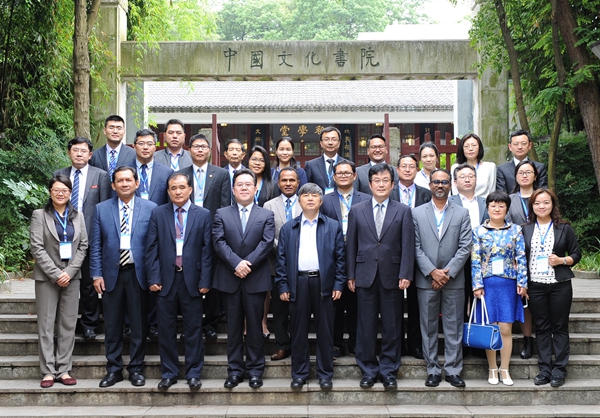
On 16 may 2017, the Network of ASEAN-China Think Tank (NACT) Working Group (WG) Meeting in Promoting of People-to-People Exchanges through Cooperation in Culture was held in Guizhou University. The meeting, cosponsored by China Foreign Affairs University and National University of Singapore, organized by Guizhou University, conducted in-depth discussions on four specific topics of cultural cooperation, namely “Achievements and Challenges in Cultural Cooperation between ASEAN and China”, “Implementation of the Action Plan of ASEAN-China Cultural Cooperation (2014-2018) and Prospects on a Post-2018 Agenda”, “The Construction of ASEAN Socio-Cultural Community and China’s Role” and “Cooperation in Specific Fields”. Prof. Jiang Ruiping, Vice President of China Foreign Affairs University, and Mr. Song Baoan, Vice President of Guizhou University, attended the opening ceremony. Officials of relevant government administrations of ASEAN, experts and scholars from education and research institutions of both sides, and representatives of ASEAN Secretariat and the ASEAN-China Centre totaling about 30 people participated in the meeting.
Vice President Song Baoan said in his remarks that the meeting was a special research project of NACT since its inception in line with the Belt and Road Initiative and the new developments of ASEAN-China relations. He believed that the meeting would make great contributions to the development of ASEAN-China relations, and also provide guidance to Guizhou University in its work as one of the NACT research bases in China and the ASEAN-China Education and Training Centre. Vice President Jiang Ruiping gave a brief introduction on major NACT projects for the development of ASEAN-China relations since its establishment in 2014. He said that the meeting was aimed at implementing the important initiative by Chinese Premier Li Keqiang at the 19th ASEAN-China Summit to promote people-to-people exchanges as a new pillar of ASEAN-China cooperation. NACT would conduct three WG Meetings on culture, tourism and education respectively in China, Lao PDR and Singapore. With the deliberation and approval of NACT coordinators’ meeting, a report on the three WG Meetings would be submitted to the ASEAN-China Summit as policy proposals.
Deputy Director Sun Jianhua of Education, Culture and Tourism of ASEAN-China Centre briefed in Section 1 of the meeting on the mandate of the centre and its achievements in implementing the important consensus reached by leaders of the two sides and in promoting practical cooperation in the broad cultural area, and put forward opinions and suggestions on the topic “Achievements and Challenges in Cultural Cooperation between ASEAN and China’’. He also moderated Section 2 in discussion on the topic “Implementation of the Action Plan of ASEAN-China Cultural Cooperation (2014-2018) and Prospects on a Post-2018 Agenda”. All participants of the meeting believed that cultural cooperation is a bridge leading to heartfelt communications between the peoples of ASEAN and China. A stronger cultural bond would surely further enhance mutual political trust, promote the growth of cultural industry in the region and inject new vitality into ASEAN-China relations.